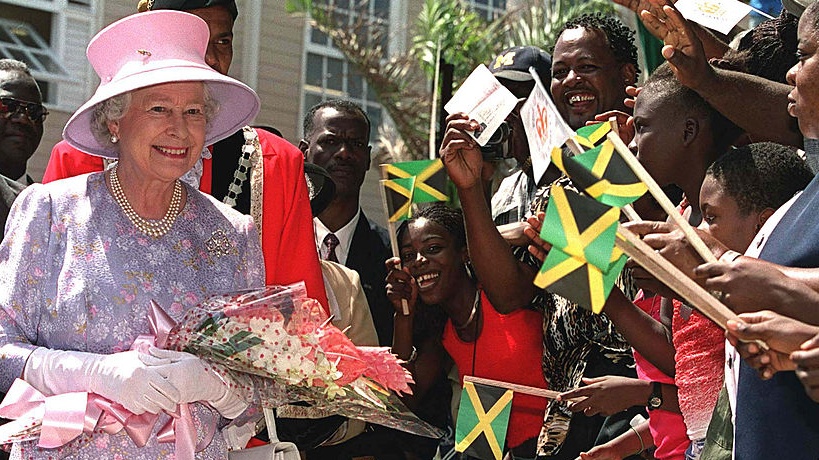Jamaican lawmakers are seeking slave reparations from Great Britain in a request that could grant billions of pounds back to the former British colony, Reuters reported.
Beginning in the 16th century, enslaved Black people were forcibly removed from their homeland in Africa and brought to the U.S. colonies and the Caribbean to work on plantations, cultivating sugar cane, bananas and other crops.
"We are hoping for reparatory justice in all forms that one would expect if they are to really ensure that we get justice from injustices to repair the damages that our ancestors experienced," Olivia Grange, minister of sports, youth and culture in Jamaica, told Reuters in an interview.
"Our African ancestors were forcibly removed from their home and suffered unparalleled atrocities in Africa to carry out forced labour to the benefit of the British Empire," she added. "Redress is well overdue."
Jamaica was seized from Spain by the British in 1655 but did not become an independent nation until 1962. The country still remains in the Commonwealth with the queen as the head of state.
According to the National Library of Jamaica, the transatlantic trade is believed to have displaced between 10 and 20 million Africans from their homeland, with approximately 600,000 arriving in Jamaica, the largest port for slaves, between 1533 and 1807.
After learning of the potential for compensation, Twitter users jumped in to support Britain distributing reparations back to the West Indian country.
Jamaica demanding reparations from England over slavery is the only news I care about right now.
— The Brandon Gonez Show (@brandongonez) July 13, 2021
WE COMING FOR THE JEWELS ON THE QUEEN’S CROWN. DAS RIGHT https://t.co/Bk5tluUQ7m
— Nana ???? (@_PureIvory) July 12, 2021
The monarchy needs to be abolished and all the money used to pay reparation to countries they basically kidnapped people from and sold into slavery. They represent Nazis. #ReparationsNow
https://t.co/y6RsaoOM4e— JayF (@d3vot3d2ang3l) July 7, 2021
Just return all the stolen jewellery from The Crown Jewels in the Tower of London back to their original countries and you’ll STILL have change after giving out reparations. https://t.co/yRmFzimCwH
— Miranda Ashitey (@mizzieashitey) July 7, 2021
Love it!
And while we’re here. Get France on the phone.
-Haiti. https://t.co/Qv2BFHofP5— Thighland Resident (@ReeReeBos) July 12, 2021
After Britain abolished slavery in its empire in 1834, the British government took out a 20 million pound loan to compensate slave owners and finished paying off the ensuing interest payments in 2015.
Jamaican Labour Party Member of Parliament Mike Henry, who is spearheading the petition, says Britain owes Jamaica roughly 7.6 billion pounds in today’s currency for the money that was paid to slaveholders.
"I am asking for the same amount of money to be paid to the slaves that was paid to the slave owners," Henry said. "I am doing this because I have fought against this all my life, against chattel slavery which has dehumanized human life."
If approved by Jamaica's National Council on Reparations, the petition will then head to the attorney general in addition to three legal teams. Next, the motion will move on to Queen Elizabeth.
Mhm run me my cheque https://t.co/XQ519s6KCU
— Trev| SEO Copywriter ???? (@minnihunni) July 7, 2021
Can the United States blacks do the same?
To Britain… because they brought our asses here (not all of us, but a lot of us) along with the U.S.
And Portugal, Spain, France… and whomever else. https://t.co/b2s70Jy2Zl
— Reneé Lynn (@iAmReneeLynn) July 12, 2021
The British monarchy is a global history of the slaughter and destruction of indigenous people. Their rapacious greed consumes them, they are a curse on humanity.???? #AbolishTheMonarchy
#colonisation = #commonwealth
https://t.co/lSzxuCG8sv— NubianQueenBee (@BeeNubian) July 6, 2021
"The attorney general's chambers would need to weigh up the merits of the petition in the eventuality of the government of Jamaica's involvement in the petition and that it would be the responsibility of the attorney general's chambers to file the petition on behalf of the people of Jamaica," Grange said in an address to the House of Representatives last week, Newsweek reported.
Mark Golding, opposition leader and president of the People's National Party (PNP) in Jamaica, said that the petition has bipartisan support.
"PNP has been part of the thrust to seek reparations for the ongoing effects of slavery; a commission on reparations was established some years ago and that has continued across administrations in Jamaica so I would say there's bipartisan support for the effort to try and get an acknowledgment of the righteousness of the cause," Golding said.
